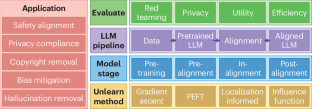Rethinking machine unlearning for large language models
IF 18.8
1区 计算机科学
Q1 COMPUTER SCIENCE, ARTIFICIAL INTELLIGENCE
引用次数: 0
Abstract
We explore machine unlearning in the domain of large language models (LLMs), referred to as LLM unlearning. This initiative aims to eliminate undesirable data influence (for example, sensitive or illegal information) and the associated model capabilities, while maintaining the integrity of essential knowledge generation and not affecting causally unrelated information. We envision LLM unlearning becoming a pivotal element in the life-cycle management of LLMs, potentially standing as an essential foundation for developing generative artificial intelligence that is not only safe, secure and trustworthy but also resource-efficient without the need for full retraining. We navigate the unlearning landscape in LLMs from conceptual formulation, methodologies, metrics and applications. In particular, we highlight the often-overlooked aspects of existing LLM unlearning research, for example, unlearning scope, data–model interaction and multifaceted efficacy assessment. We also draw connections between LLM unlearning and related areas such as model editing, influence functions, model explanation, adversarial training and reinforcement learning. Furthermore, we outline an effective assessment framework for LLM unlearning and explore its applications in copyright and privacy safeguards and sociotechnical harm reduction. Machine unlearning techniques remove undesirable data and associated model capabilities while preserving essential knowledge, so that machine learning models can be updated without costly retraining. Liu et al. review recent advances and opportunities in machine unlearning in LLMs, revisiting methodologies and overlooked principles for future improvements and exploring emerging applications in copyright and privacy safeguards and in reducing sociotechnical harms.


重新思考大型语言模型的机器非学习方法
我们在大型语言模型(LLM)领域探索机器学习,称为LLM学习。该倡议旨在消除不希望的数据影响(例如,敏感或非法信息)和相关的模型功能,同时保持基本知识生成的完整性,不影响因果无关的信息。我们设想,法学硕士学习将成为法学硕士生命周期管理的关键要素,有可能成为开发生成式人工智能的重要基础,这种人工智能不仅安全、可靠、值得信赖,而且不需要全面的再培训,还具有资源效率。我们从概念制定,方法,指标和应用中导航法学硕士的遗忘景观。我们特别强调了现有法学硕士遗忘研究中经常被忽视的方面,例如遗忘范围、数据模型交互和多方面的功效评估。我们还将LLM学习与模型编辑、影响函数、模型解释、对抗训练和强化学习等相关领域联系起来。此外,我们概述了法学硕士学习的有效评估框架,并探索其在版权和隐私保护以及减少社会技术危害方面的应用。
本文章由计算机程序翻译,如有差异,请以英文原文为准。
求助全文
约1分钟内获得全文
求助全文
来源期刊

Nature Machine Intelligence
Multiple-
CiteScore
36.90
自引率
2.10%
发文量
127
期刊介绍:
Nature Machine Intelligence is a distinguished publication that presents original research and reviews on various topics in machine learning, robotics, and AI. Our focus extends beyond these fields, exploring their profound impact on other scientific disciplines, as well as societal and industrial aspects. We recognize limitless possibilities wherein machine intelligence can augment human capabilities and knowledge in domains like scientific exploration, healthcare, medical diagnostics, and the creation of safe and sustainable cities, transportation, and agriculture. Simultaneously, we acknowledge the emergence of ethical, social, and legal concerns due to the rapid pace of advancements.
To foster interdisciplinary discussions on these far-reaching implications, Nature Machine Intelligence serves as a platform for dialogue facilitated through Comments, News Features, News & Views articles, and Correspondence. Our goal is to encourage a comprehensive examination of these subjects.
Similar to all Nature-branded journals, Nature Machine Intelligence operates under the guidance of a team of skilled editors. We adhere to a fair and rigorous peer-review process, ensuring high standards of copy-editing and production, swift publication, and editorial independence.
 求助内容:
求助内容: 应助结果提醒方式:
应助结果提醒方式:


